Art, in the form of non-fungible tokens, is now being valued in the millions. Along with the skyrocketing price tags has emerged an almost inevitable downside: scams. While shady characters and bad actors are constantly looking for new ways to take advantage of unsuspecting buyers, several NFT scams have become more common than others. Here are several scams to keep an eye out for while navigating through the NFT space.
NFT Scam #1: Faulty Discord Verification
What it is: When you purchase an NFT from a particular project, you can obtain a new role in their Discord by verifying your NFT. To do this, you will need to type in a command like !join or !verify which then triggers a DM from a verification bot (ie, Collab.land). In most cases, the channel where you type in this text is visible to others. Scammers will sit and watch to see who is entering !join or !verify and will then DM them pretending to be Collab.Land, for example. From there, they share a link with the user that enables them to steal their NFTs.
How to avoid it: If you have safely verified your NFTs in another Discord server or on a previous occasion, you will see multiple Collab.Land DMs all within the same message. This is a good indicator that it is indeed Collab.Land as you have used it in the past. When clicking on the verification link, or any link in Discord for that matter, make sure that the URL is correct. For example, the subdomain “api.callab.land” could lead to a scammer’s website while “api.collab.land” is the correct subdomain.
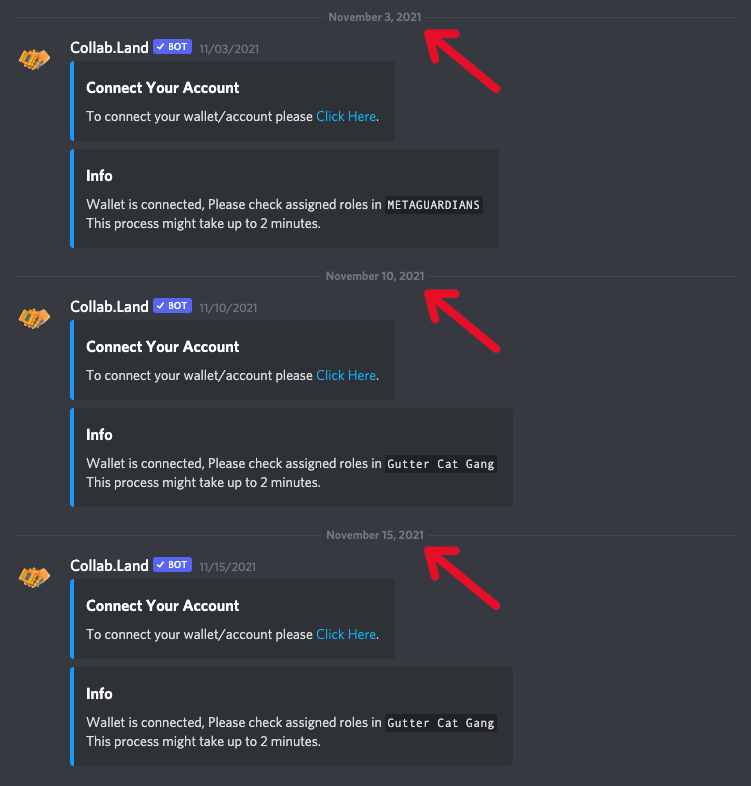
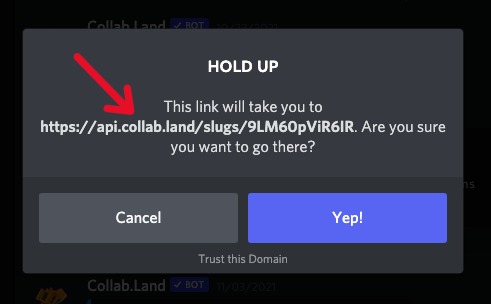
NFT Scam #2: Deals in the DMs
What it is: While it’s not uncommon to receive offers via direct messages from your frens (if you’re concerned that was a typo, be sure to check out our handy-dandy NFT glossary), it’s also not entirely uncommon that you’ll get DMs from scammers as well. In this NFT scam, a fellow Twitter or Discord user will DM asking to do a trade. They convince their trusting victim to send over their NFT first and then never follow through on their end of the deal whether it was supposed to be swapping them for another NFT or sending ETH. They may also attempt to do the private deal using a fraudulent link that allows them to steal your NFTs.
How to avoid it: List your item for sale through a trusted marketplace and reserve it for the specific buyer. Your NFT will be put up for sale but only the wallet address that you include will be able to purchase it. This will ensure that you receive the funds as promised and you don’t fall victim to clicking on any suspicious links.
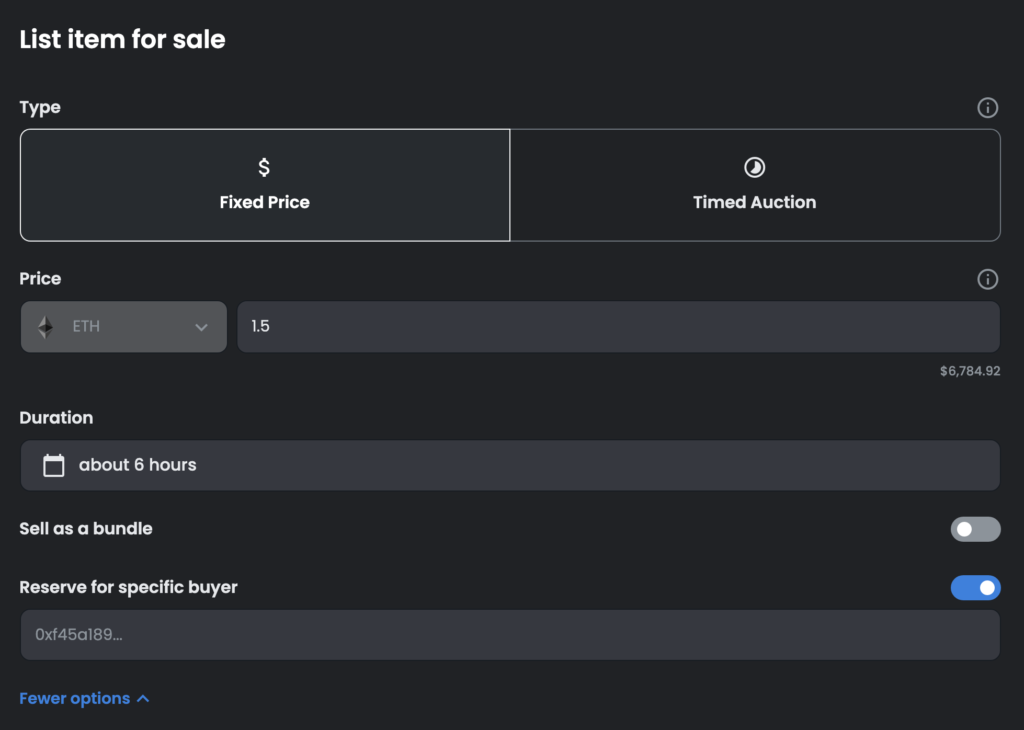
NFT Scam #3: Impersonating Someone on Social Media
What it is: Social media is a target-rich environment for NFT scammers. Con artists will carefully copy the social media profiles of existing NFT projects and NFT artists. These phony pages are carefully crafted and appear amazingly like the originals. Scammers then use this feigned legitimacy to sell fake artwork by leading you to their copycat project listed on an NFT marketplace.
How to avoid it: To avoid being duped by these cleverly cloned accounts, first check for a verification checkmark next to the account’s username. This is a good indication that the account you are following is indeed who they say they are. You can also visit their website to see if the social media accounts listed on their site match the social accounts you’re following. If you are a member of the project’s or artist’s Discord, check to see if they have listed their official links there. This is a safe way to make sure you’re following the correct accounts.
NFT Scam #4: Fake Giveaways
What it is: Closely related to fake social media accounts are fake giveaways that trick users into believing they’ve won big. In most cases, the prize is a free NFT or a certain amount of Ethereum. In this scam, a fake NFT account will message users – often via Twitter or Discord – informing them that they are the lucky winner. They’ll be provided a link to a website where they are prompted to connect their wallet and enter their seed phrase in order to “claim their prize”. Giving out your seed phrase is game over as it gives the scammer access to your wallet.
You should never, under any circumstance, share your seed phrase (aka Secret Recovery Phrase) with anyone.
How to avoid it: As is true with avoiding many digital scams, never click on links until you can authenticate them and confirm that the account they are being sent from is legitimate. Always look at the URL in your web browser as it may help determine whether a site is legitimate or not.
NFT Scam #5: Fiat Offers
What it is: If you’ve listed an NFT for sale, don’t be too surprised when you start receiving offers on it. You’ll likely get both bot and human offers which is great. BUT, beware of people who place offers using another kind of currency. For example, if you’ve listed an NFT for 1.49 ETH, a scammer may try and trick you by offering you 1.49USD.
How to avoid it: Set a minimum offer amount for your NFTs. In OpenSea, go to Settings > Offers. From there, you can set a minimum offer for each collection to ignore low offers and avoid being scammed.
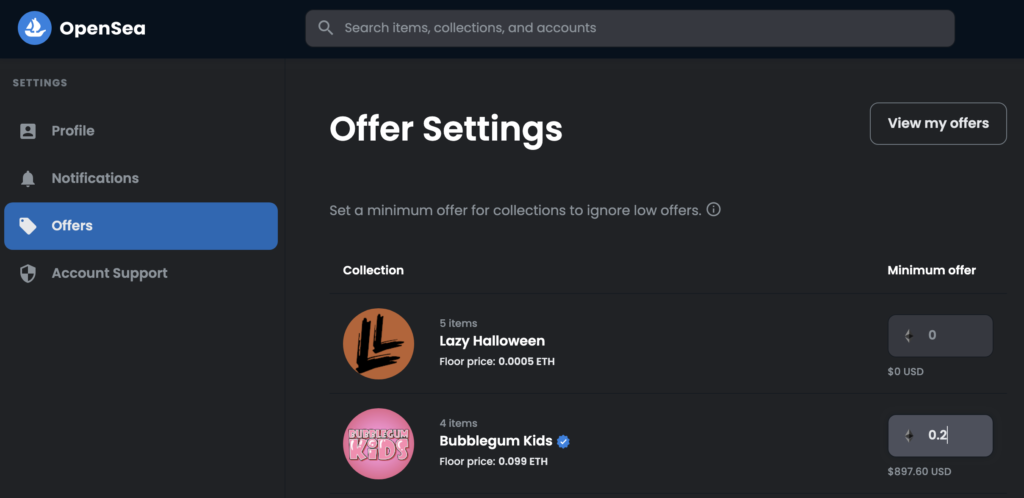
NFT Scam #6: Fraudulent NFT Bundles
What it is: While shopping for your next NFT, you may come across bundles. Bundles are a collection of several NFTs that you can purchase in one shot as opposed to purchasing them individually. While this may lead you to a good deal, you will need to be a little more careful when dealing with bundles. Scammers will list a bundle that includes NFTs that don’t actually belong to them or may even be counterfeit.
How to avoid it: Carefully examine each NFT included in the bundle and make sure that each one is part of the exact same NFT collection. Looking at the project name is not enough – you will need to hover over the name to see if the project URL is the correct URL. You can also double-check to see if the “Created by” information is the same (and, correct of course!) from NFT to NFT.
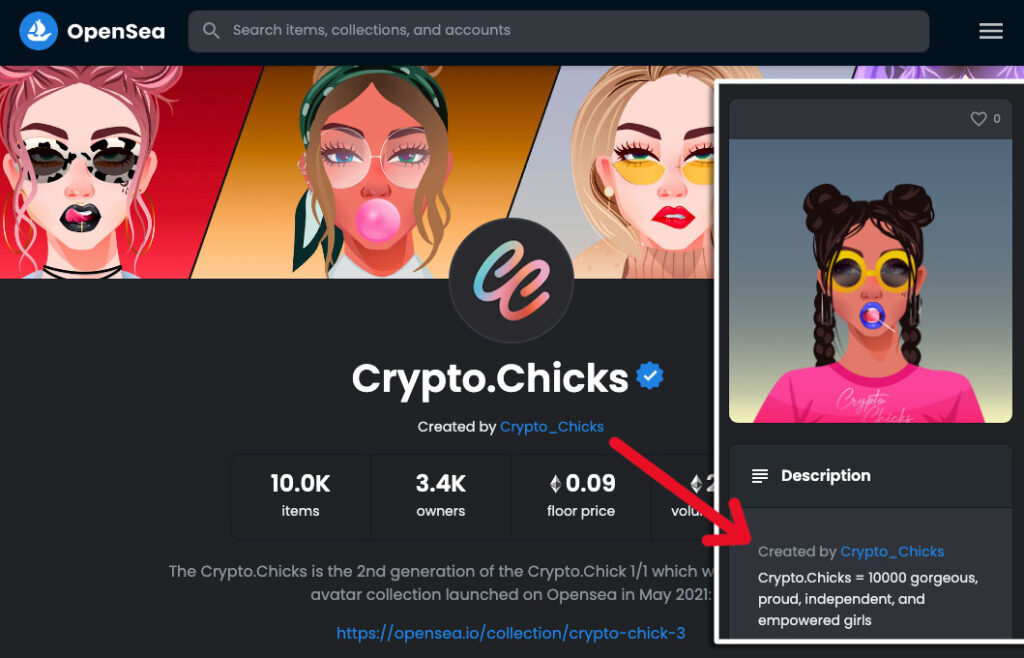
NFT Scam #7: Fake NFT Projects
What it is: When a particular NFT project gains traction, it is sure to draw the attention of both excited buyers and bad actors alike. Scammers will create entire collections that resemble that of an authentic project hoping to trick users into buying their fake NFTs instead of the real ones.
How to avoid it: If possible, use the collection link provided by the NFT artist or team in Discord or follow the link directly from their website. If you search using the search bar in an NFT marketplace like OpenSea, for example, check to see if the project has a verification checkmark as well as an appropriate number of items listed in the collection.
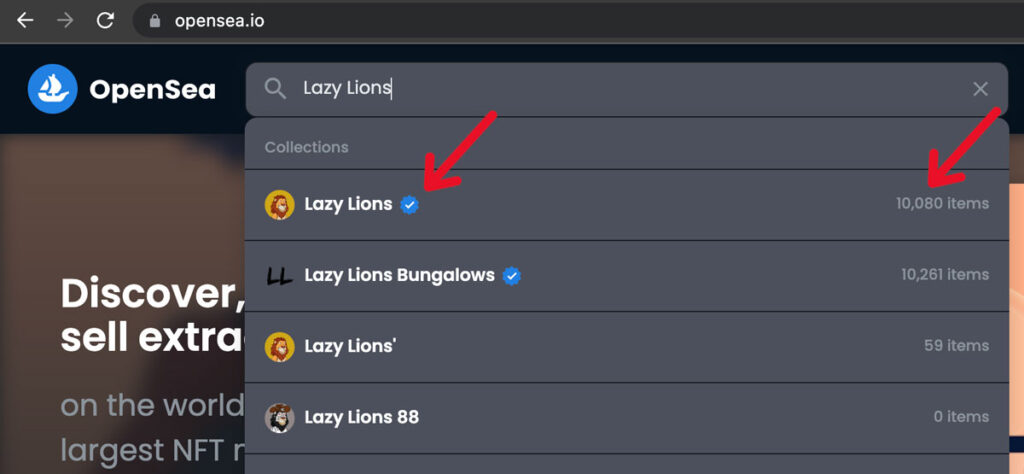
NFT Scam #8: Fake NFT Marketplaces
What it is: The next NFT scam on our list includes the replication of popular NFT marketplaces. These faux online platforms can look so close to the original that they can even trick experienced NFT buyers into buying and then getting stuck with fake & worthless artwork.
How to avoid it: It’s always important to research the NFT in which you are interested in so you have at least some idea of its worth and the project’s current floor price. On sham NFT marketplaces, NFTs that should sell for hundreds of thousands will be priced at a fraction of that. If a price seems too good to be true, it almost always is.
NFT Scam #9: Email Phishing
What it is: Now, this one is very prominent both inside and outside of the NFT space. Scammers will email you pretending to be a reliable source and will attempt to get you to click on a link or open an attachment that can enable them to access your personal information.
How to avoid it: If you receive an email, regardless of who it’s from, be very careful when clicking on any links or downloading any attachments. Check the sender’s email address to see if the domain name is correct. Remember, it is a scammer’s job to trick you. Something as simple as missing a single letter in a sender’s email address (ie, team@opensea.io versus team@openseas.io) can mean the difference between being scammed and staying safe.
NFT Scam #10: Impersonating Customer Support
What it is: Discord is a known place for this scam. If you are chatting in a support channel, a scammer can DM you, posing as customer support. Fabricated customer service representatives can lure unsuspecting users into giving out their sensitive information when trying to resolve issues related to their NFTs.
How to avoid it: When trying to get help in a support channel, make sure you don’t disclose sensitive information. Also, consider how you are accessing a company’s customer service team. If it’s a simple question where the team can help without obtaining your personal information, Discord may do the trick. If it’s a more complex scenario, and your personal information is required to solve an issue, it’s a good idea to visit the company’s official website and fill out their contact form or obtain their contact information from there.
While it’s an unfortunate reality that scammers have found a new home in the NFT space, you can take steps to avoid being duped by them. Stay informed and DYOR to learn about the latest NFT scams and how to avoid them. With knowledge and a certain level of caution, you can keep yourself safe while exploring the world of NFTs.







